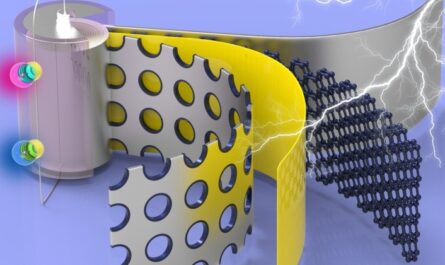Researchers from RMIT have made a breakthrough in proton flow battery technology, tripling its energy density and enabling it to compete with commercially available lithium-ion batteries. With a specific energy density of 245 Wh/kg, the proton battery is on par with lithium-ion batteries used in the Tesla Model 3. However, unlike lithium-ion batteries, the proton battery does not use lithium, avoiding concerns about lithium scarcity and dependence on China for their supply. Additionally, proton batteries offer a more sustainable approach to energy storage, as they are rechargeable, recyclable, and made from abundant and inexpensive materials.
Proton flow batteries operate by using hydrogen for energy storage. During charging, the battery accepts water, which is then split into positively charged hydrogen ions and oxygen. In conventional hydrogen systems, these ions are combined to form H2 gas or processed into ammonia. In contrast, the proton battery stores the hydrogen protons directly in a solid, porous activated carbon electrode soaked in a dilute acid. When the battery is discharged, oxygen is added, and energy is released as water is produced.
The researchers improved the performance of the proton battery by investigating the oxygen-side reactions and implementing some key modifications. These include vacuum drying the activated carbon powder prior to electrode preparation, mild heating of the cell during operation, and using a thinner gas diffusion layer (GDL) fiber sheet. As a result, the energy per weight capacity of the proton battery increased almost threefold, with a density of 882 joules per gram or 245 Wh/kg.
Once commercially available, proton batteries offer several advantages. They provide a safe and stable method for transporting hydrogen, eliminating the need for high-pressure gas or cryogenic liquid. The batteries are also expected to have a long lifespan and a fast charging time. Additionally, proton batteries are cost-effective, as they do not rely on the usage of lithium or other exotic metals. Instead, they utilize carbon, an abundant and inexpensive resource. Furthermore, proton batteries are 100% recyclable, addressing concerns about end-of-life environmental challenges associated with other types of rechargeable batteries.
Dr Shahin Heidari and Dr Seyed Niya posing with their proton battery prototype.
The researchers are now focusing on optimizing the overall system design to further improve its efficiency. While the specific energy based on electrode mass is currently 245 Wh/kg, this figure may decrease when factoring in the mass of other battery components. However, the researchers believe that by optimizing the overall cell design and operation, they can raise this figure and achieve a roundtrip efficiency of over 75%, comparable to that of lithium-ion batteries.
Although the proton battery may not be as energy-dense as gaseous or liquid hydrogen, it presents itself as a strong competitor to traditional fuel cells. The team intends to commercialize the technology and collaborate with Eldor Corporation to produce a prototype battery that meets the requirements of various domestic and commercial applications. The goal is to scale up the system from the watt to the kilowatt and ultimately to the megawatt scale.
In conclusion, cheap proton batteries with high energy density pose a significant challenge to lithium-ion batteries. By avoiding the use of lithium and utilizing abundant and recyclable materials, proton batteries offer a sustainable and cost-effective alternative for energy storage. With further optimization and commercialization efforts, proton batteries have the potential to revolutionize the battery industry and meet the energy needs of various applications.
*Note:
1. Source: Coherent Market Insights, Public sources, Desk research
2. We have leveraged AI tools to mine information and compile it




